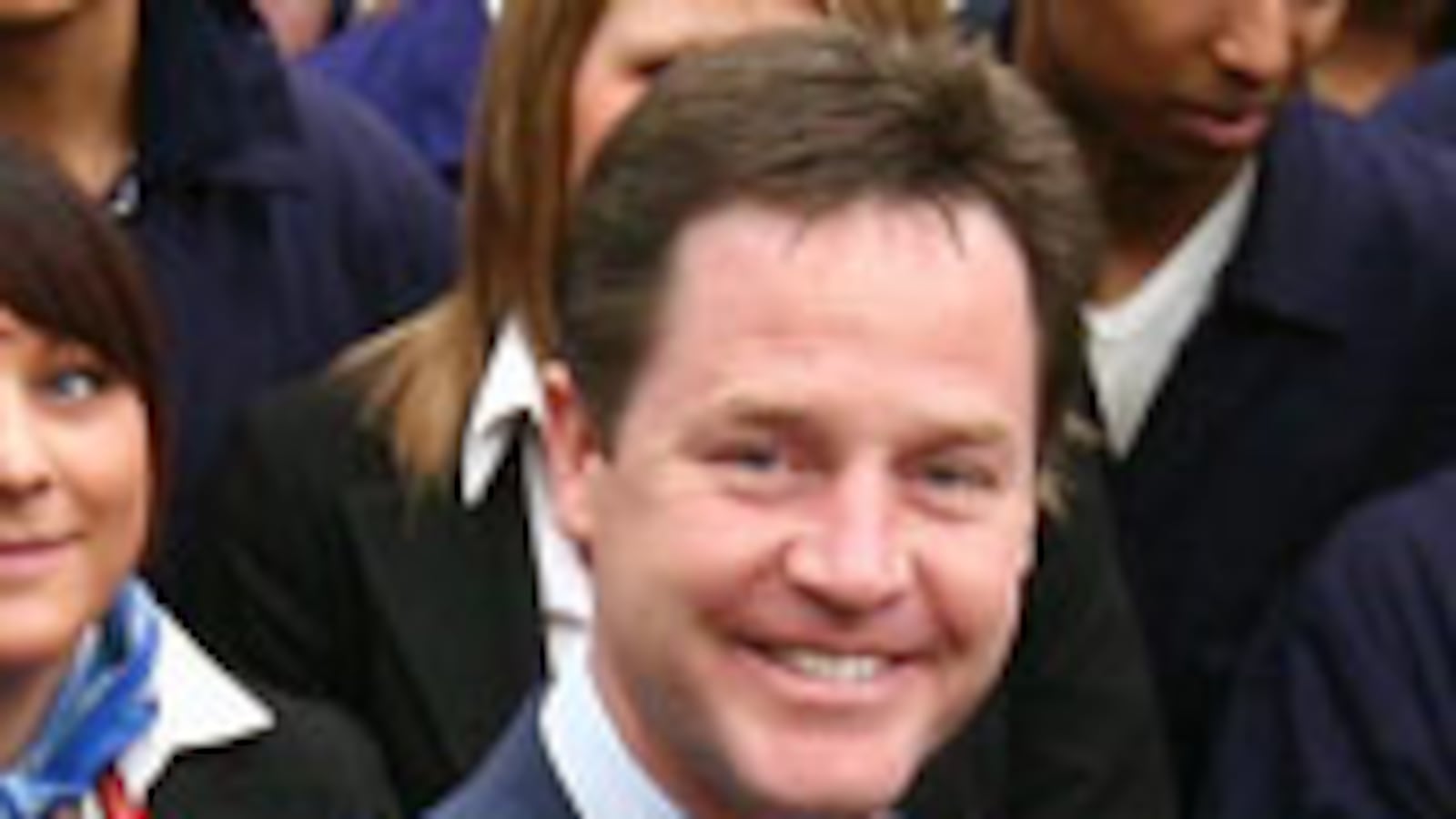
This British election becomes more improbable the closer we get to polling day. Few people anticipated the rise of the Liberal Democrats; fewer still thought they might actually win more votes than the Labour Party. That is now a real possibility. Even fewer thought Gordon Brown's temper would betray him in such spectacular style.
A simple walkabout in Rochdale, Lancashire ought not to have presented many problems even to a Prime Minister who has—with reason, it turns out—been carefully shielded from the general public during the campaign. But Brown’s encounter with Gillian Duffy, a pensioner and widow, provided the indelible image of the campaign so far. Mrs. Duffy voiced her concerns about the number of workers flocking to Britain from Eastern Europe and was, as is customary, fobbed off with platitudes.
The improbable is beginning to become the inevitable: The Liberal Democrats may determine the future of Britain and change the political map for good.
So far, business as usual—until a television microphone picked up Brown’s anger as he sped from the scene in his Prime Ministerial limo: “That was a disaster—they should never have put me with that woman. Whose idea was that? It’s just ridiculous...” Asked what Mrs Duffy had said, he replied: “Everything, she was just a bigoted woman.”
There’s no good way to spin that to your advantage. A humiliating apology during a radio interview was followed by an even ghastlier return to the scene of the crime and a 40 minute conversation with Mrs. Duffy. No one quite knows what the fall-out from this will be but few can imagine it being anything other than disastrous for Labour.
Brown's appalling meltdown has only bolstered Nick Clegg and his Liberal Democrats, the poster boys this election season. Their campaign for "change" can only benefit from Brown's self- evisceration.
In 1972 Robert Redford starred in The Candidate as a glamorous, fresh, long-shot Californian politician who, improbably, found himself swept to victory and sent to Washington to serve in the United States Senate. The movie's tagline was: “Too Handsome. Too Young. Too Liberal. Doesn't have a chance. He's PERFECT!”
Something similar may be said of Nick Clegg, the young, personable, no-hope leader of Britain's Liberal Democrats, who now finds himself on the brink of an astonishing victory and, like Redford's character, must answer the question: "What do we do now?"
This is not a question leaders of the Liberal Democrats, traditionally Britain's ignored third party, are accustomed to asking, let alone answering. But as this general-election campaign has progressed, the improbable is beginning to become the inevitable: The Liberal Democrats may determine the future of Britain and change the political map for good.
For two weeks now the polls have suggested that, in terms of voting share, Clegg's party could push Labour into a humiliating third place. The eccentricities of the British electoral system mean that even if Labour were to finish third, the party is likely to win more seats than the Liberals and could even, if the chips fall correctly, remain the largest party at Westminster.
But one consequence of the televised debates that have been such a boon to Clegg: that share of the vote now carries more weight, morally though not constitutionally, than simply winning the most seats. The election is increasingly framed as a presidential-style contest between the leaders, not simply a battle between parties.
Clegg has declined to say whom he would support in a coalition government, save for accepting that if Labour come third in the popular vote it would be "preposterous" for Brown to remain as prime minister, even with the Liberal Democrats’ support. The most likely scenario has the Conservatives winning. If they come close to a majority, they’ll likely tough it out as a minority government, but if they fall, say, 50 seats short, what will Clegg do and what will Cameron offer him?
Although the parties could reach an agreement on issues such as spending cuts, public-sector reform, and decentralization, there remain significant stumbling blocks before any shotgun Tory-Liberal marriage could be consummated.
The most significant is electoral reform—for decades the Liberals' Holy Grail. Switching from Britain's traditional First Past the Post system to a more proportional mechanism would ensure that if, as they did in 2005, the Liberal Democrats won 22 percent of the vote they would be rewarded with rather more than 62 of the 646 seats in the House of Commons. But electoral reform is a major stumbling block for the Conservatives who fear, with some reason, that any more proportional system might prevent the party from winning a majority ever again. Cameron has accused Clegg of wanting “to hold the whole country to ransom just to get what would benefit the Liberal Democrats" and said plainly, “I don’t support changing our electoral system.” Despite this, Cameron declined to rule out at least talking about electoral reform in any post-election scenario.
Queering the pitch still further, Labour has undergone a convenient tactical conversion to the cause of electoral reform, proposing a referendum on a new election system at some point in the next parliament.
Clegg, however, has dismissed Brown's claims to seriousness on the matter, holding the prime minister "personally responsible" for blocking past efforts at changing the system. Nevertheless, Clegg also needs to win his party's backing before entering any coalition government and Liberal Democrat members are more enthusiastic about a Liberal-Labour pact than coming to an arrangement with the Conservatives.
There's danger for Clegg in all this jockeying for position and influence too. One way to become just like the "two old parties" he lambasts might be to behave just like any other horse-trading, in-it-for-his-own-advantage politician. Novelty, like any other sheen, can wear off quickly.
On Tuesday Clegg summed up his position: "It is not for me to decide; it is for people to decide how the government should be formed. I am not the kingmaker, David Cameron is not the kingmaker, Gordon Brown is not the kingmaker. There are 45 million people who have still got to choose and I am not going to short-circuit that. It is simply not for any politician to do that."
"I am prepared to work with anybody who shares my view."
In other words no one, not even the candidate himself, knows what will happen next or what Clegg's party will do.
No wonder everyone is confused as we enter the final week of campaigning in this bewildering, unusual, election.
Alex Massie is a former Washington correspondent for The Scotsman and The Daily Telegraph. He currently writes for The Spectator and blogs at www.spectator.co.uk/alexmassie.






